Logic5
Inference can be defined as deriving new knowledge from existing knowledge through logical reasoning. There are two types of inference: antecedent and consequent. Antecedent inference derives a conclusion from premises where the truth of the premises implies the truth of the conclusion. Consequent inference derives a conclusion from premises where the falsity of the conclusion implies the falsity of one or more premises. Inference can also be mediate, involving reasoning through a third or middle term, or immediate, involving reasoning directly from one proposition to another without an intermediate step. Mediate inference includes deduction, reasoning from general to specific, and induction, reasoning from specific examples to general conclusions.
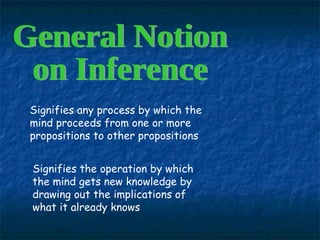
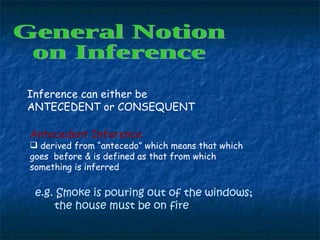
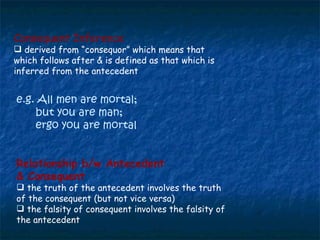
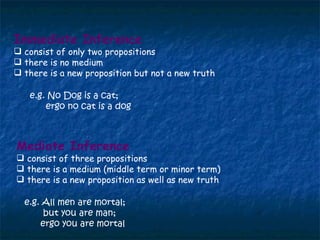
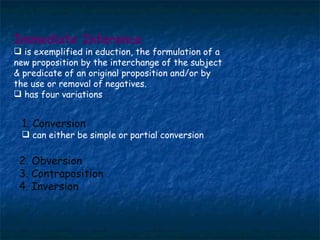


Recommended
More Related Content
Similar to Logic5 (20)
Recently uploaded (20)
Logic5
- 1. General Notion on Inference Signifies any process by which the mind proceeds from one or more propositions to other propositions Signifies the operation by which the mind gets new knowledge by drawing out the implications of what it already knows
- 2. General Notion on Inference Inference can either be ANTECEDENT or CONSEQUENT Antecedent Inference derived from ÔÇ£antecedoÔÇØ which means that which goes before & is defined as that from which something is inferred e.g. Smoke is pouring out of the windows; the house must be on fire .
- 3. Relationship b/w Antecedent & Consequent the truth of the antecedent involves the truth of the consequent (but not vice versa) the falsity of consequent involves the falsity of the antecedent Consequent Inference derived from ÔÇ£consequorÔÇØ which means that which follows after & is defined as that which is inferred from the antecedent e.g. All men are mortal; but you are man; ergo you are mortal
- 4. Mediate Inference consist of three propositions there is a medium (middle term or minor term) there is a new proposition as well as new truth e.g. All men are mortal; but you are man; ergo you are mortal e.g. No Dog is a cat; ergo no cat is a dog Immediate Inference consist of only two propositions there is no medium there is a new proposition but not a new truth
- 5. Immediate Inference is exemplified in eduction, the formulation of a new proposition by the interchange of the subject & predicate of an original proposition and/or by the use or removal of negatives. has four variations 1. Conversion can either be simple or partial conversion 2. Obversion 3. Contraposition 4. Inversion
- 6. Mediate Inference consist of the Deductive & inductive inference Deduction the process by which the mind proceed from a more universal truth to a less universal truth Induction the process by which the mind proceed from sufficiently enumerated instances to a universal truth e.g. All men are mortal but Peter is a man; ergo Peter is mortal. e.g. This ruminant (cow) is cloven-hoofed, this antelope, and goat are cloven-hoofedergo all ruminants are cloven-hoofed.
- 7. Thanks a lot folks for listening!
